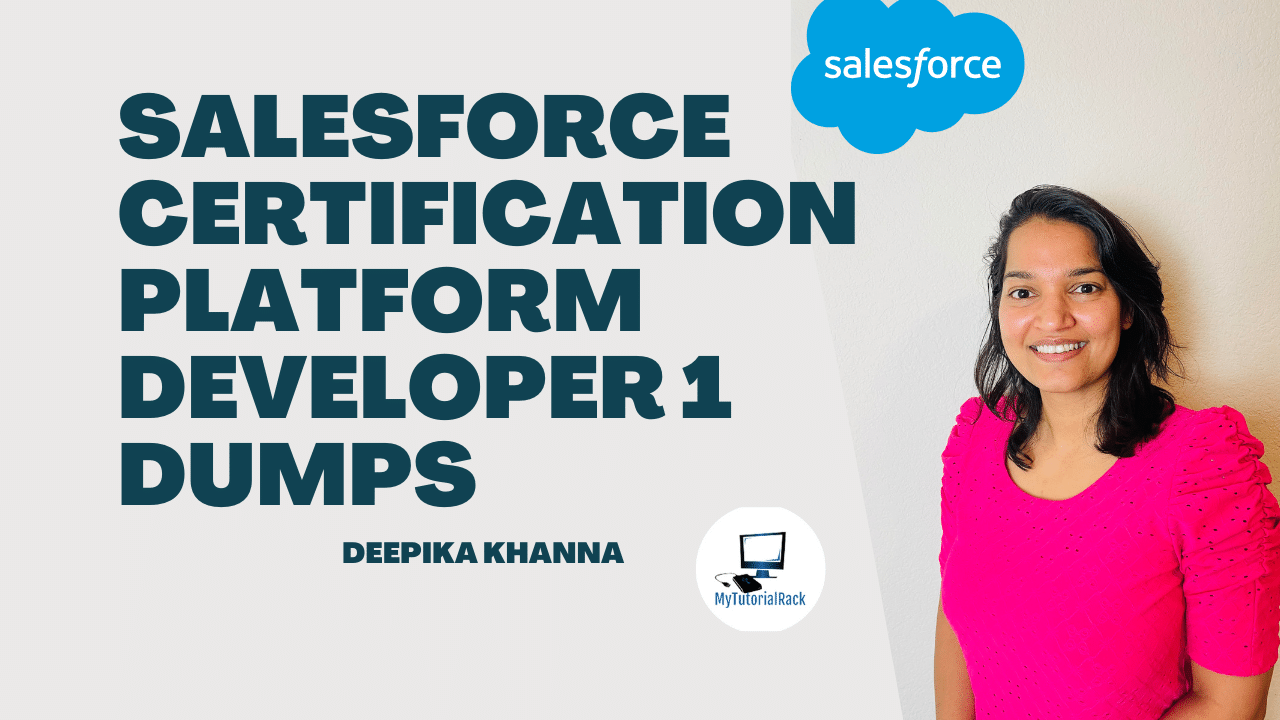Preparing for the Salesforce Certification Platform Developer 1 Exam can feel overwhelming, especially when navigating through complex concepts like Apex, Lightning Components, and MVC architecture. While practice exams and hands-on experience are essential, supplementing your study with reliable resources such as Salesforce Certification Platform Developer 1 dumps can help streamline your learning process.
In this blog post, we’ll break down key sample questions and answers, providing practical insights and strategies to help you ace the exam and earn your certification with confidence.
This exam is your ticket to showcasing your expertise in building custom applications on the Salesforce platform. To help you succeed, we’ve curated 10 sample questions with answers and explanations, giving you a glimpse into the types of questions you can expect and strategies to tackle them. Let’s dive in!
Table of Contents
Toggle1. MVC Architecture: Identifying the Controller
Question: A developer at Cloudy Computing creates a Lightning Web Component that imports a method from an Apex class. When a user presses a “Validate” button, the method runs to execute complex validations. Which artifact acts as the controller in this MVC architecture?
- A) HTML file
- B) JavaScript file
- C) XML file
- D) Apex class
Answer: D) Apex class
The Apex class handles the application’s logic and data flow, fulfilling the role of the controller in the MVC framework. The HTML file and JavaScript file represent the view, while XML is unrelated in this context.
2. Multi-Tenant Environment Benefits
Question: What is NOT a benefit of developing applications in a multi-tenant environment?
- A) Enforced best practices for development
- B) Access to predefined computing resources
- C) Unlimited processing power and memory
- D) Default out-of-the-box configuration
Answer: C) Unlimited processing power and memory
In a multi-tenant environment, resources are shared and limited. While scalability is a feature, processing power and memory are not infinite. Other options highlight actual benefits of the multi-tenant setup.
3. Collection Types in Salesforce
Question: Which collection type provides unique key-value pairings?
- A) Map
- B) List
- C) Array
- D) Set
Answer: A) Map
A Map stores unique key-value pairs, allowing efficient lookups using keys. Lists and arrays handle ordered elements and can contain duplicates, while sets ensure uniqueness but lack key-value pairing.
4. Sharing Settings in Apex Code
Question: A developer at Cloudy Computing writes code without specifying “with” or “without” sharing. What automatically respects organization-wide defaults and sharing settings?
- A) Apex classes
- B) HTTP callouts
- C) Custom controllers
- D) Anonymous blocks
Answer: D) Anonymous blocks
Anonymous blocks run without specific sharing settings, ensuring compliance with organization-wide defaults and user-specific permissions. Apex classes, custom controllers, and HTTP callouts require explicit sharing configurations.
5. Configuring Trace Flags
Question: For which items can a trace flag be configured? (Choose 3 answers.)
- A) Apex Trigger
- B) Apex Class
- C) Process Builder
- D) User
- E) Visualforce
Answers:
- A) Apex Trigger
- B) Apex Class
- D) User
Trace flags can monitor and debug Apex triggers, Apex classes, and specific users. Process Builder and Visualforce do not support trace flags.
6. Benefits of the Lightning Component Framework
Question: What is one key benefit of the Lightning Component Framework?
- A) Better integration with Force.com sites
- B) Better performance for custom Salesforce1 mobile apps
- C) More centralized control via server-side logic
- D) Pre-built components replicating Salesforce’s look and feel
Answer: D) Pre-built components replicating Salesforce’s look and feel
The Lightning Component Framework offers pre-built components for a seamless and consistent Salesforce UI experience. Other options describe secondary benefits or unrelated features.
7. Overriding Standard Actions with Visualforce
Question: To override a standard action with a Visualforce page, which attribute must be defined in the <apex:page> tag?
- A) pageReference
- B) override
- C) standardController
- D) controller
Answer: C) standardController
The standardController attribute links the Visualforce page to a standard object, enabling overrides for actions like “New” or “Edit.”
8. Enforcing Field-Level Security in Visualforce
Question: How can a developer enforce field-level security and reduce maintenance for a Visualforce page used by support reps and managers?
- A) Create one Visualforce page for both profiles
- B) Use a permission set for support managers
- C) Create separate pages for each profile
- D) Use a custom controller with “with sharing”
Answer: D) Use a custom controller with “with sharing”
A custom controller with “with sharing” respects field-level security settings, applying changes dynamically without duplicating effort.
9. Apex Test Class Features
Question: What features are available when writing Apex test classes? (Choose 2 answers.)
- A) Set error types to ignore in Developer Console
- B) Write assertions after
@futuremethod - C) Modify the created date in test data
- D) Use CSV files for testing data
- E) Set breakpoints in test classes
Answers:
- C) Modify the created date in test data
- D) Use CSV files for testing data
Test classes in Salesforce allow the modification of certain fields and the use of CSV files for data setup, streamlining testing workflows.
10. Ideal Environment for Source-Driven Development
Question: Which environment should developers use for source-driven projects with independent configurations?
- A) Developer sandboxes
- B) Scratch orgs
- C) Full copy sandboxes
- D) Developer orgs
Answer: B) Scratch orgs
Scratch orgs are lightweight and customizable, ideal for source-driven development and version control. Developer sandboxes and full copy sandboxes are less flexible, while developer orgs are not suited for collaborative projects.
Checkout our Practice Test Course
To help you effectively prepare for the Salesforce Platform Developer 1 Certification exam, we offer a comprehensive practice test course that includes over 200+ questions with detailed answers.
This course is designed to simulate the actual exam experience, covering all the key topics and concepts you’ll encounter, such as Apex programming, Lightning Web Components, and MVC architecture.
By practicing with these questions, you’ll gain a deeper understanding of the material, boost your confidence, and identify areas that need further review. Whether you’re just starting your journey or looking to fine-tune your knowledge, our practice test course is an invaluable resource to ensure you’re fully prepared to succeed on exam day
Conclusion
Mastering the Salesforce Platform Developer 1 exam is a crucial step in advancing your Salesforce career. These sample questions offer a solid foundation, but consistent study and practice are key to success. Explore resources like practice exams and Salesforce’s Trailhead modules to further your preparation.
Ready to excel? Subscribe to our channel for more tips, and good luck on your Salesforce journey!




